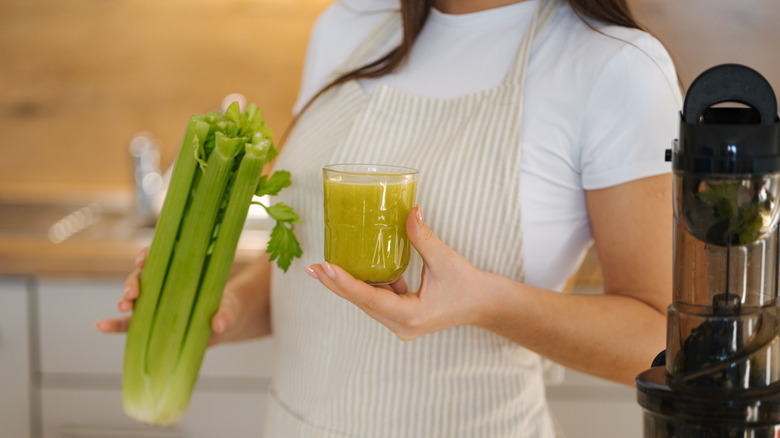One Of The Most Hydrating Beverages You Can Drink Is An Underrated Vegetable Juice
Staying hydrated can be harder than you might think, particularly as you get older. In fact, 3 in every 4 people in the United States are said to be "chronically dehydrated," and up to 28% of American seniors spend their days dehydrated (via StatPearls). And even if you're far from being a senior adult, you still may struggle to keep your hydration levels high.
Though carrying a water bottle around is a good way to remind yourself to sip up, you don't have to rely on water alone to achieve your hydration goals. You can turn to other beverages, including an underrated juice that might not be in your fridge — but perhaps should be.
That juice is celery juice. And if you've only thought of celery as a charcuterie platter addition, occasional snack, or salad ingredient, think again. Like many vegetables, celery can be juiced — and its juice contains nutrients that can help you get and remain better hydrated.
Rich in the hydration helper potassium
Celery is mostly water. Per data from the U.S. Department of Agriculture, a 236-gram serving of raw celery contains 225 grams of water (approximately 95% of its weight). Therefore, when you put celery through a juicer, you're losing its fiber but keeping the water, along with other nutrients. Those tagalong nutrients include potassium, which can be a key supporter in your journey to more consistent levels of hydration.
The potassium in celery juice can have an extra-hydrating effect because it is an electrolyte (via the American Heart Association). As such, one of its chief roles is to balance the amount of water in your system so you avoid fluid retention, which, if left unmitigated, can lead to dehydration (per MedlinePlus).
Consequently, consuming celery juice daily can do more than get you hydrated. It can also make it easier for your body to effectively use the water you take in through all foods and beverages.
Therapeutic with a couple of caveats
There are a couple of other upsides to celery juice. First, celery juice is high in antioxidants. In a 2017 review in the Journal of Evidence-Based Complementary and Alternative Medicine, researchers concluded that celery juice could work as a natural therapeutic healing agent due to its antioxidants. Additionally, WebMD notes that celery juice contains phytochemicals that may reduce inflammation. Therefore, you may be getting more advantages than you imagined with every sip.
Despite its benefits, celery juice has two potential issues to keep in mind. Foremost, be careful not to drink it excessively. Celery juice is rich with psoralens, which have been associated with skin conditions and skin cancer.
Next, be aware that celery juice's earthy and often bitter overtones may make it unpleasant to you. To make it more pleasing to your taste buds, you may want to disguise its taste by adding a little cinnamon. You could also consider adding it to your smoothie along with other foods that will mask celery juice's natural flavors.


